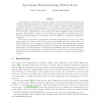Free Online Productivity Tools
i2Speak
i2Symbol
i2OCR
iTex2Img
iWeb2Print
iWeb2Shot
i2Type
iPdf2Split
iPdf2Merge
i2Bopomofo
i2Arabic
i2Style
i2Image
i2PDF
iLatex2Rtf
Sci2ools
SIGECOM
2009
ACM
2009
ACM
Approximate mechanism design without money
The literature on algorithmic mechanism design is mostly concerned with game-theoretic versions of optimization problems to which standard economic money-based mechanisms cannot be applied efficiently. Recent years have seen the design of various truthful approximation mechanisms that rely on enforcing payments. In this paper, we advocate the reconsideration of highly structured optimization problems in the context of mechanism design. We argue that, in such domains, approximation can be leveraged to obtain truthfulness without resorting to payments. This stands in contrast to previous work where payments are ubiquitous, and (more often than not) approximation is a necessary evil that is required to circumvent computational complexity. We present a case study in approximate mechanism design without money. In our basic setting agents are located on the real line and the mechanism must select the location of a public facility; the cost of an agent is its distance to the facility. We est...
Approximation | Information Management | Mechanism Design | SIGECOM 2009 | Truthful Approximation Mechanisms |
| Added | 28 May 2010 |
| Updated | 28 May 2010 |
| Type | Conference |
| Year | 2009 |
| Where | SIGECOM |
| Authors | Ariel D. Procaccia, Moshe Tennenholtz |
Comments (0)

